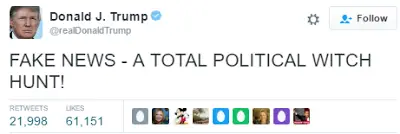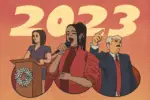Differences Don’t Divide
In a time of social and political unrest, it’s time for young Americans to cross party lines, ask questions and engage in discourse.
By Flavia Martinez, Amherst College
Dear friends and classmates,
The 2016 U.S. presidential election was far from normal, as it divided friends, family members and significant others.
A source of continued division among American citizens is pride. Everyone wants to “stick to their guns,” and tension between voters has become all too personal. Divisions are exposing themselves everywhere, especially on social media. In the past, people from across the political spectrum used platforms like Facebook and Twitter to share articles during the election season, but this year was different.
What makes the 2016 election different from past ones is the presence of fake news. Though the media generally talks about fake news as it relates to the right, I came across a number of sites catering to people like me, who find themselves on the left.
On several occasions, a website looked a bit off, and I’d never heard of the news source before, so I ignored the article. Fake news articles, for voters on both sides of the political spectrum, are dangerous. They’re not neutral or factual and, therefore, not journalistic. They’re polarizing and unproductive.
Fake news has even entered Donald Trump’s rhetoric. Though much of the fake news that circulated during the election was in favor of Trump, the president uses the term to shut down and dismiss news from reputable sources, especially on his Twitter account, where “fake news” appears more than ten times in his tweets.

Even scarier than fake news is the notion of “alternative facts.” At my college in Massachusetts, Amherst College, a first-year student submitted a piece for immediate publication to “AC Voice,” an online student-run publication. The piece contained what she believed to be striking evidence in support of Trump’s travel ban, but the article was instead riddled with unsupported claims.
The student simply echoed the messages that figures like Kelly Anne Conway, Sean Spicer and President Trump relay to the public. Why should political figures be exempt from scutiny? No one’s word should be taken as fact, and political difference should not stifle our ability to ask questions. Questioning is key.
I was lucky enough to grow up in a town with a strong public school system that taught me to question everything. Questioning was, and continues to be, an integral part of my classroom experience. Though I don’t see a lot of my friends and classmates from high school anymore, I am still connected to them through Facebook. A large portion of the articles these classmates share are from extreme right-wing news sources, and it makes me wonder how post-high school experiences shaped people politically.
Whenever I see an old friend share an article from an extreme source, my heart beats fast in my chest, and I’m suddenly shaken. It’s not the content of the article that upsets me, but the fact that I know and respect the person who shared the article.
Without being personally connected to the author, I can easily analyze their work, make any necessary criticism and continue scrolling. Knowing the person who shares the article, though, I find it extremely hard to simply move on.
Right before Election Day, someone I knew from high school posted a photo of herself with a patriotic caption and the hashtag #MAGA (Make America Great Again). I wanted to like the post, and I would have, had it not been for #MAGA.
Having grown up in the most conservative county in New Jersey, it’s understandable that my high school classmates find themselves leaning toward the right. When being conservative means supporting the current Republican party, however, matters are a bit different. With President Trump as its leader, the Republican party has become the face of overt discrimination.
My grandparents consider themselves conservative and have always voted for the Republican party. My nana hasn’t been shy about sharing her views on taxes, whether it’s at the dinner table or elsewhere. Do I disagree? Yes, but it’s okay. These political differences don’t worry me.
We’ve spent other family dinners where, after discussing the food on our plates or what we did last week, the conversation changes to politics. Suddenly, my grandparents are discussing how African American youth don’t know how to behave or how refugees are dangerous. These kinds of political “differences” worry me.

I understand that my grandparents are older and from a different era. Sometimes, they still call people of Asian descent “Orientals.” It hurts, but I know that they’re the product of eighty years of U.S. history. They claim to not ascribe to Trump’s dogma, but they do, whether they know it or not.
Sometimes I try to talk about politics with them, and the conversation is always similar. I’m not sure if we’ll ever see eye to eye. Young people, on the other hand, are perhaps more flexible and ready to engage in discussion.
When Donald J. Trump won the 2016 U.S. election, I was surprised by the percent of young people who voted for him. It’s hard to see people from high school, with whom I’ve shared laughs and casual chit chat, share right-wing articles on Facebook, but it’s necessary.
Reading conservative posts, like those that followed the Women’s March, on my newsfeed was difficult, but I didn’t unfollow the people who shared them. I want to see their content because I want to engage with people whose vote differed from mine. It’s worth it to sit down and engage in conversation. The spread of a message at a grassroots level was key to the Trump presidency, and I think discussion at a grassroots level is just as powerful.
To my fellow millennials, I encourage you to question everything. Whenever you watch the news, read an article or enter a political discussion with someone, question everything. Read articles from various news sources and collect numbers and figures, because nothing is more satisfying than cold, hard facts.
Facts are necessary to fighting corruption, as they give meat to arguments and speculations. Donald Trump is our president, and we have at least four years to figure out how to hold the country together. That is a fact. The United States can’t simply shut down when the need to stay up-to-date and educated on current happenings has never been greater.
As a fellow young American handling the aftermath of the 2016 election, I encourage you to talk with your peers, no matter where they lie on the political spectrum. Hillary Clinton may not be our president, but we can still be “stronger together.”
Best,
Flavia

















